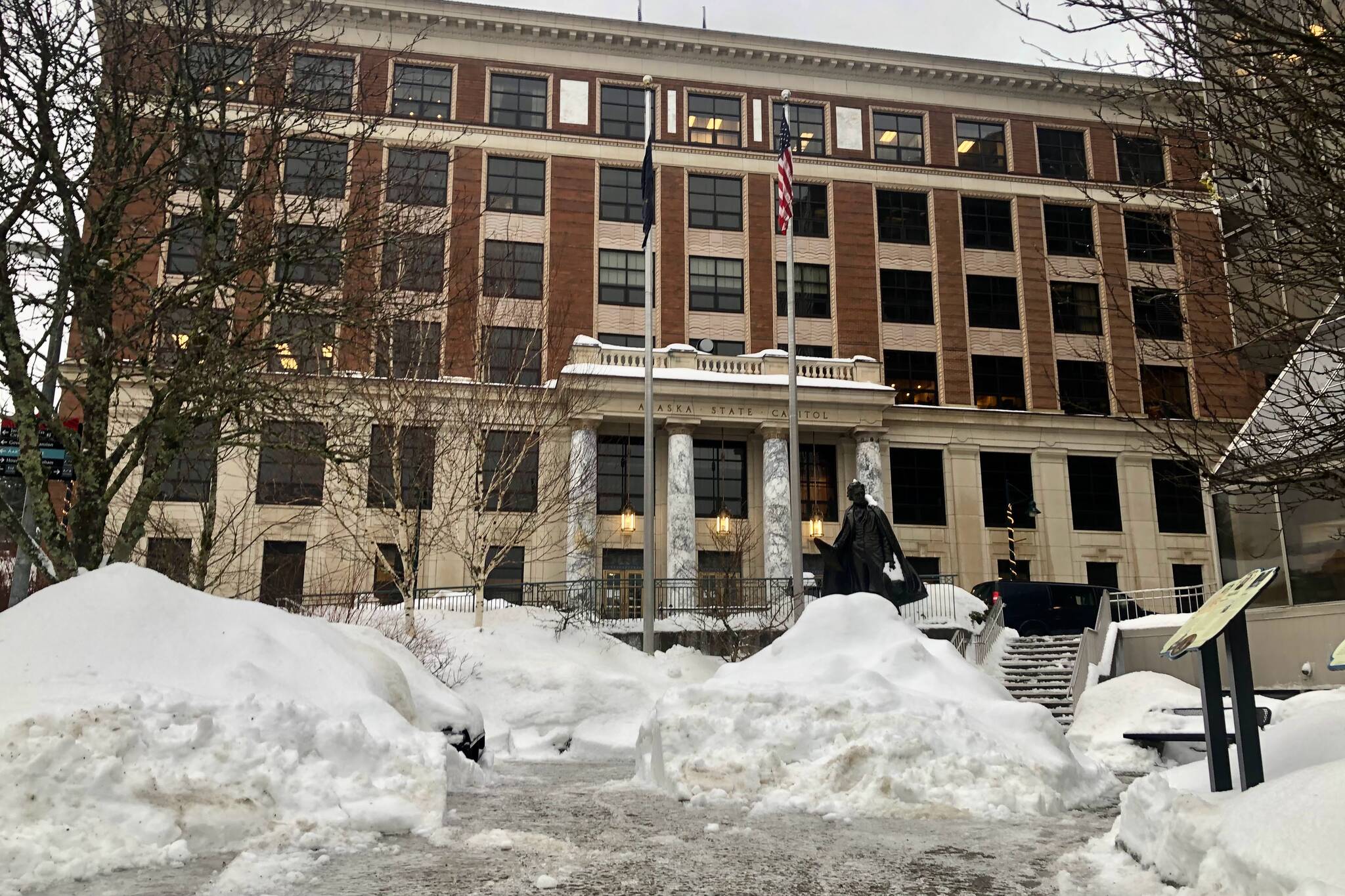Juneau’s city and state officials are cautious about the upcoming session of the Alaska State Legislature which begins Tuesday, Jan. 18, but noted political divisions remained as the state moves into an election year.
“The overarching themes of the session will not be radically different,” from past years, said state Sen. Jesse Kiehl, D-Juneau, during a Monday morning meeting between city leaders and Juneau’s state delegation. “You will see the Legislature spend a great deal of time on what to do with the (Permanent Fund Dividend).”
Gov. Mike Dunleavy’s proposed budget would fully fund the state’s obligation for school bond debt reimbursement, Kiehl said, which the Legislature has tried to fund in the past only to be met with vetoes from the governor. State repayments of school bonds have been a priority for municipal governments for years, but Kiehl noted that money wouldn’t cover deferred maintenance projects or new school repair projects.
The federal infrastructure bill passed by Congress last year means the state can expect to receive considerable amounts of money for capital projects, according to Katie Kachel, a lobbyist with the Washington, D.C., firm Blank Rome, hired by the City and Borough of Juneau to advocate on its behalf. But the exact details of that funding were still in the works, according to Kachel, who said her firm was working with federal grant writers to try and secure funding for Juneau.
[Update: Heavy snow prompts closings]
Some funding from the Infrastructure Investment and Jobs Act —what the White House calls the “Bipartisan Infrastructure Deal” —will be sent directly to state transportation departments and other existing funding channels, Kachel said, but there were other discretionary funds available that would benefit the city. Still, Kachel said, it would take time for those monies to be allocated.
“All of this is going to take some time to get the money out the door,” Kachel said. “It’s going to take some time for them to get the money out and to stand up the new programs.”
State Rep. Sara Hannan, D-Juneau, said securing funding to try and restore and improve the Alaska Marine Highway System was a priority for her, as well as clean up of per-and polyfluoroalkyl substances, known as PFAS chemicals, both of which have funding provided by the infrastructure bill.
But even as the state can expect considerable funding for capital projects, lawmakers noted the state’s own budget issues remained, and this session is an election year — putting pressure on lawmakers to advance personal legislation. Among the pre-filed legislation is a bill from state Sen. Mike Shower, R-Wasilla, that would move legislative sessions to Anchorage —something city leaders do not want to see happen as state government provides many year-round jobs for Juneau.
Hannan, who co-chairs the Legislative Council which manages the Capitol complex, noted the Juneau Community Foundation recently gifted the Assembly Building near the State Capitol to the Legislature, allowing for an expansion of state offices without having to purchase additional property.
Retaining state jobs in Juneau was a priority mentioned by Juneau Mayor Beth Weldon and other members of the CBJ Assembly —several of whom work for the state government —and the loss of state jobs for the city was a concern. Kiehl said at the meeting that jobs advertised by the state often offered the location as Juneau or Anchorage.
Juneau continues to lose state jobs, City Manager Rorie Watt told the Empire in an interview, and city leaders are always vigilant about that issue. Watt said the city has worked to make Juneau and the facilities around the Capitol complex attractive for a state workforce, but the lack of housing makes it difficult to retain workers. Watt said city officials have examined grant proposals for additional housing in the downtown area, and the Assembly is set to discuss some of those grants at a meeting Monday evening.
“I think that’s an area that we’re going to be more aggressive,” Watt said. “Our need outstrips the supply for sure.”
Bolstering the state’s education system was important for training a state workforce able to fill those state jobs, said Rep. Andi Story, D-Juneau, as well as the jobs coming to the state through federal infrastructure projects. Story said she will pre-file a bill increasing the base student allocation —the amount of money the state spends on each Alaskan student.
The state’s finances have improved slightly, Kiehl said, but not enough to balance the state budget. Kiehl said he pre-filed a statewide income tax bill and Hannan said she’s proposed a tax on nicotine-based vape products as a way of increasing state revenues.
This session will be the last regular session of the 32nd Legislature, and any bills not passed will not be carried over to the next one. All members of the Alaska House of Representatives are up for reelection, as are several state senators, but this year is also an election year for the governor.
Watt told the Empire he’d like to see some sense of financial stability in state services and funding, but was pessimistic that would happen during an election year.
• Contact reporter Peter Segall at psegall@juneauempire.com. Follow him on Twitter at @SegallJnuEmpire.

